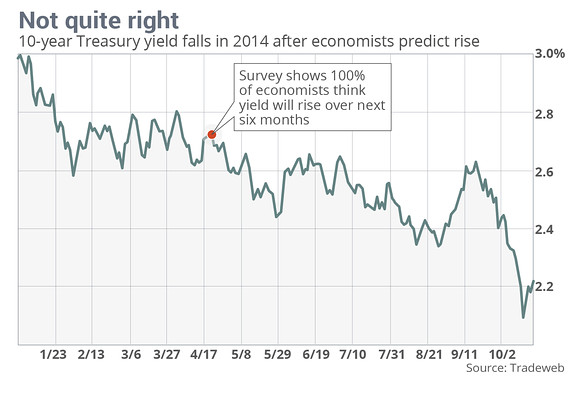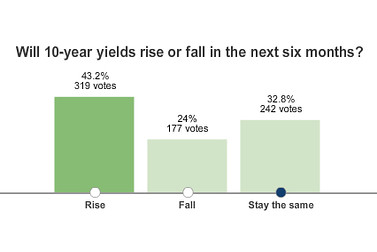Why Economists Can Often Be Ignored By Traders & Investors
Why Economists Can Often Be Ignored By Traders & Investors
Yes, 100% of economists were dead wrong about yields
Back in April every economist in a survey thought yields would rise. Guess what they did next
by Ben Eisen
[BigTrends.com note: We've often said that we prefer to listen to traders and investors (and foremost the charts and indicators) rather than economists, because the first group puts their money where their mouth is, while the second tends to straddle the fence and often deals in theory rather than reality. This following article underscores that.]
Just about six months ago, a headline flashed across the top of MarketWatch's home page. It read: "100% of economists think yields will rise within six months."
The April 22 report was based on a Bloomberg survey of 67 economists, all of whom expected the 10-year Treasury (TLT) note yield - which closed at 2.73% that day - to rise over the following half year.
"How quickly we would get to 4[%] was the discussion at the beginning of the year," said Mohamed El-Erian, chief economic adviser at Allianz SE, on CNBC Tuesday morning.
The market, however, has a funny way of leaning one way, just as the herd is heading in the other direction.
On Tuesday, the 10-year note traded at a yield of 2.21%, almost four-tenths of a percentage point lower than in April. Let's not forget that the yield unexpectedly dipped below 2%, just last week.
That underscores the difficulty of calling the direction of interest rates. It also makes all 67 economists wrong, as this chart of the benchmark yield shows:
Bond Yields vs Economists' Predictions

Treasury yields tend to rise, and prices drop, as the U.S. economy grows and investors begin to expect the Federal Reserve to normalize monetary policy more quickly.
"There's an inherent bias out there that you can only get validation that the economy is improving if rates go up," said George Goncalves, head of interest-rate strategy at Nomura Securities. He was among the strategists spring that yields would keeping falling.
But the relationship between yields and the economy isn't always linear. Despite steady improvement in the economic numbers, yields have continued to fall. That's in part because of sluggish growth abroad, which has helped push back market views of when the central bank will begin hiking rates.
Goncalves added that falling yields have actually been a boon to the economy this year, keeping financial conditions loose and supporting the housing market. That creates a somewhat paradoxical situation where economic growth and yields are moving in the opposite direction.
The survey of economists' yield projections is generally skewed toward rising rates - only a few times since early 2009 have a majority of respondents to the Bloomberg survey thought rates would fall. But the unanimity of the rising rate forecasts in the spring was a stark reminder of how one-sided market views can become. It also teaches us that economists can be universally wrong.
Then again, the majority of MarketWatch readers weren't exactly expecting rates to fall either, judging by an informal survey taken at the time:
Looking forward, can you guess in which direction the most recent Bloomberg survey of economists shows yields are headed? Yep, the answer is up.
Courtesy of MarketWatch.com

